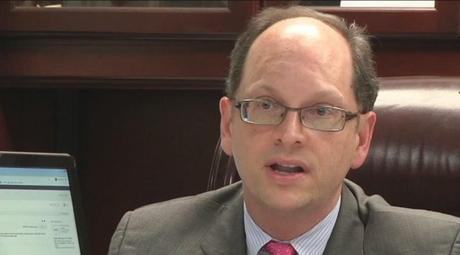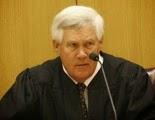
Robert Vance Jr.
An Alabama judge overruled himself this week, finding unlawful his earlier ruling that prevented the Montgomery Advertiser newspaper from reporting on documents it had received from a public-records request about potentially dangerous gas lines.Jefferson County Circuit Judge Robert Vance Jr. found that his first ruling represented a prior restraint that is forbidden under the First Amendment to the U.S. Constitution. Vance struck down his own temporary restraining order (TRO), and Alabama Gas Company withdrew its request for a preliminary injunction, essentially admitting it never had a case for preventing the practice of journalism based on lawfully obtained documents.
In a roundabout way, both Vance and Alabama Gas added to the mountain of evidence that proves my arrest last October, and the resulting five-month incarceration, were unlawful.
Ironically, Vance's actions came just days after a special prosecutor in the Alabama Attorney General's Office was quoted in court documents as saying "the Riley machine" was "going down" in a Lee County grand-investigation. Special Prosecutor Matt Hart was referring to former Republican Governor Bob Riley and his close associates, apparently including son Rob Riley.
Hart's words have special resonance here at Legal Schnauzer because Rob Riley filed the defamation lawsuit that sought a TRO, preliminary injunction, and permanent injunction against me. We now know, from Judge Vance's actions, that everything Rob Riley sought in his lawsuit was unlawful. We also know that my incarceration--based on an alleged refusal to obey a TRO and injunction that stood contrary to roughly 200 years of U.S. law--also was unlawful. (The court did not even have jurisdiction over me because I never was lawfully served with the complaint, and I filed a motion seeking to quash service; unbelievably, I was arrested before the court addressed that issue.)
How can you be arrested on the orders of a court that has no jurisdiction over you? How can you be held in contempt of court for allegedly violating a court order that is unlawful in the first place? You can't. Was Judge Vance going to send Montgomery Advertiser reporters and editors to jail for doing exactly what the First Amendment says they can do? Was Judge Vance going to incarcerate reporters and editors from USA Today, which is working with its Gannett News Service colleagues in Montgomery and other locations on the gas-line series? Of course, not. (You can read reporter John Kelly's opening article in the series here.)
Why did Vance come to his senses and make a lawful ruling? One reason might be that the Montgomery newspaper could afford to hire prominent media lawyer Dennis Bailey, while I was representing myself. I was correct all along on the applicable law, but I still spent five months of my life unlawfully behind bars. So much for the notion of "equal protection under the law" in American courts.
(By the way, I am not a fan of Judge Vance. I've seen him rule contrary to law in a legal malpractice case I brought against Birmingham attorneys Jesse P. Evans III and Michael B. Odom. I've reported on a case styled William B. Cashion and Western Steel Inc. v. Mark Hayden et al, where Vance essentially stole a case that had been assigned to another judge and proceeded to rule over and over in favor of a party represented by the Birmingham firm of Maynard Cooper and Gale, which has contributed heavily to Vance's campaigns. I think so little of Vance that I actually supported Ten Commandments Judge Roy Moore over Vance in a race for chief justice of the Alabama Supreme Court. Vance, a Democrat in name only, is proof that court corruption in Alabama is not limited to Republicans.)
As for Rob Riley's lawsuit against me, why did Circuit Judge Claud Neilson, specially appointed by the Alabama Supreme Court, order me to jail? Why did even right-leaning legal analysts, such as Ken White of Popehat blog, heavily criticize Neilson's actions? Why was New York Times reporter Campbell Robertson apparently so embarrassed by Neilson that he failed to identify the judge by name in his article about my case?

Claud Neilson
The answer to those questions might be coming to light now, as we learn that Deputy Attorney General Sonny Reagan stands accused of leaking grand-jury information to individuals indicted or under investigation in a wide-ranging criminal probe. Reagan, a former legal advisor to Bob Riley, certainly qualifies as a member of "the Riley machine." And if the charges against him are proven--they were brought by Acting Attorney General Van Davis--it will show that those close to the Rileys have a tendency to obstruct justice in order to serve their own purposes--and to protect themselves.Was Rob Riley keeping with that apparent tradition when he filed a defamation lawsuit against me--and asked a court to incarcerate me based on a TRO and injunction that almost two centuries of American law say is unlawful? Did Rob Riley's lawsuit have everything to do with intimidation and almost nothing to do with defamation? Given that Riley and his codefendant sought and received some $34,000 in sanctions against me and my wife--sanctions that are no more supported by law than the bogus TRO and injunctions--was his lawsuit really about financial terrorism?
As the Sonny Reagan saga unfolds, perhaps we will learn that the answer to all of those questions is a resounding yes.
